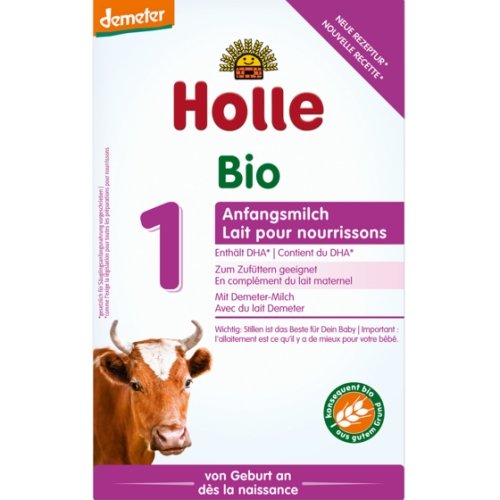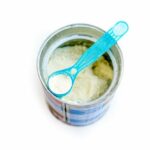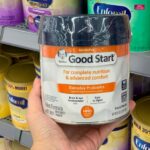Once we find out that we are pregnant, the first question that people seem to ask is, “are you going to breastfeed or formula?”
We all know that most medical practitioners will advise that breastmilk is best for your baby if you can. However, this is not always an option for every mom.
So when it is not an option, baby formula is the next best option that will provide all the nutrition that your baby needs to grow and develop.
There are many different options when it comes to baby formula, so even if your baby has allergies and intolerances to certain food groups, you should still be able to find suitable formula milk.
However, many parents feel that big brand formula manufacturers do not have their baby’s best interests at heart. So, where do you turn then if neither breast nor formula is an option for you and your baby?
We are going to look at the five best alternatives to breast milk or baby formula.
Why Would You Want An Alternative To Breast Or Traditional Formula Milk
For many women, breastfeeding is their plan once their baby is born, but unfortunately, things do not always as planned. If you are unable to produce enough milk or any milk to feed your baby, you might be looking for an alternative source of nourishment.
View in gallery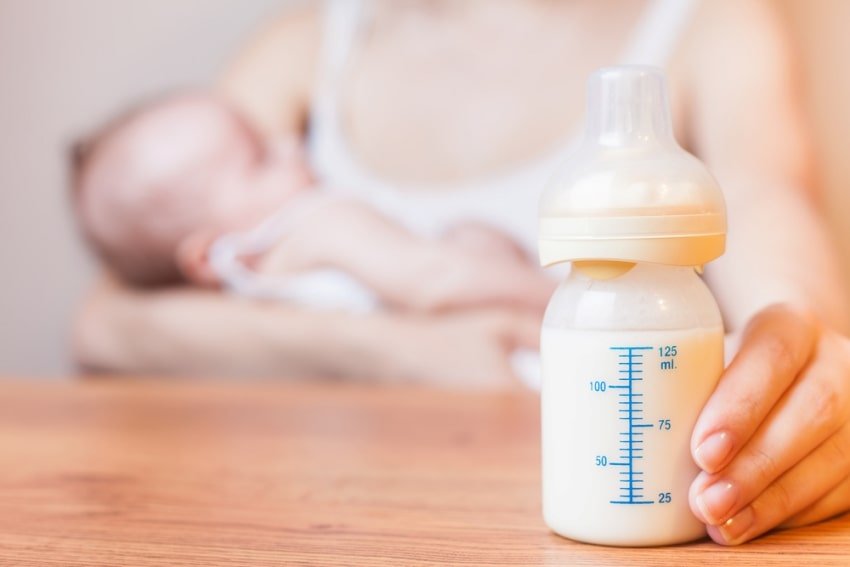
If your baby has intolerance for certain foods or allergies and is unable to find a suitable commercial formula that suits them, this is when you may be looking for alternatives outside of the traditional formula manufacturers.
In this day and age, parents are far more well informed when it comes to the ingredients that our food as a whole contains. So why would it be any different for baby formula?
Related Reading: 5 Uses for Expired Baby Formula
Many parents are not happy with what is in the formula that is supposed to nourish and help their baby develop, and so this sends them down the path of looking for other options.
5 Best Alternatives To Breast Milk And Baby Formula
1. Holle Organic Infant Formula
Holle is a European based company that has been established for over 80 years. They produce high-quality organic baby food. They do not use any chemical processing or preservatives in any of their products.
The milk used in their formula comes from cows raised on biodynamic farms that provide caring and appropriate environments for their animals.
Biodynamic farms are very similar to organic farming, but they draw concepts from the ideas of Rudolf Steiner. These farms can also become members of the international biodynamic standards group Demeter International, which Holle Organic is.
Holle Organic formula has no nasty chemicals or preservatives in their ingredient list. It is made from 99% organically grown ingredients, and their milk source is from cows raised on biodynamic farms.
The remaining 1% is made up of essential vitamins and minerals that your baby needs for growth and development.
Holle formula is priced in line with other baby formula brands and has great reviews from parents. Many have stated that it does not have a thick consistency or unpleasant smell, as many baby formulas do.
2. Goat’s Milk
Goat’s milk is often considered to be the next best thing to breastmilk. Although there are some differences that you should be aware of, goat’s milk is rich in fat but lacks folic acid and is low in vitamin B12.
Both of these are vital to the growth and development of your baby. You would need to add certain items to provide well-balanced milk that is suitable for an infant. Nutritional yeast can be added to provide folic acid and other additives to make up for the low levels of vitamin B12.
Another way you could potentially make up the deficiency of folic acid, and vitamin B12 in the goat’s milk would be to supplement it with an infant multi-vitamin.
If you needed to increase the calories that your baby was consuming, you could do this by adding rice cereal or corn syrup to the milk.
Fresh goats milk is the best, but if you have difficulty purchasing the fresh kind, you can use condensed or powdered goat’s milk. Either of these options are sufficient for making infant formula.
[amalinkspro type=”showcase” asin=”B004K69OMU” apilink=”https://www.amazon.com/dp/B004K69OMU?tag=mominformedcom-20&linkCode=osi&th=1&psc=1″ new-window=”true” addtocart=”false” nofollow=”true” sc-id=”4″ imgs=”LargeImage” link-imgs=”false” specs=”Serving Size – 1 cup~~~Does Not Contain: Preservatives, antibiotics~~~High in calcium~~~Mixing Tip: Start mixing powder with hot water first. Once powder is smooth and creamy in texture, continue to add cold water. Best when chilled in your refrigerator overnight.~~~Made in the USA ; Product outer packaging may vary as per stock availability~~~” btn-color=”#ff9900″ btn-text=”Buy on Amazon” alignment=”aligncenter” hide-prime=”0″ hide-image=”0″ hide-reviews=”0″ hide-price=”0″ hide-button=”0″ width=”750″]Meyenberg Whole Powdered Goat Milk (12 Ounce), Gluten Free, Non GMO, Vitamin D[/amalinkspro]
3. Coconut Milk
Another non-dairy plant-based offering comes from the humble coconut. Some parents have used this in their own formula recipes.
The reason that coconut milk is such a good alternative is its high fatty acid content known as lauric acid. This is the main fatty acid found in breast milk.
The lauric acid makes breast milk easily digestible; it also strengthens the immune system and protects your baby against viral, bacterial, and fungal infections.
Although coconut milk is a great alternative to breast milk, it lacks some vital elements that need to be substituted. Coconut milk does not have all the protein or calcium that an infant would need.
Many parents who have used this option have added things like liquid calcium and vitamin and mineral supplements. As coconut milk comes from a coconut, it is not considered a dairy product. This should make it safe for children and babies with dairy allergies and intolerances.
[amalinkspro type=”showcase” asin=”B001HTJ2BQ” apilink=”https://www.amazon.com/dp/B001HTJ2BQ?tag=mominformedcom-20&linkCode=osi&th=1&psc=1″ new-window=”true” addtocart=”false” nofollow=”true” sc-id=”4″ imgs=”LargeImage” link-imgs=”false” specs=”RICH & CREAMY COCONUT MILK: A staple of Thai, Indian & Caribbean cuisines, coconut milk imparts rich & creamy goodness & makes a delicious ingredient in soups, curries, sauces, desserts & beverages.~~~MILK REPLACEMENT: Our Organic Coconut Milk may replace dairy milk or cream in some of your favorite recipes with excellent results. Its sourced from certified organic traditional Thai coconut crops.~~~SUSTAINABLY FARMED: We support organic & sustainable farming that avoids GMOs & pesticides. Were proud participants in the Non-GMO Project & want our consumers to know where their food comes from.~~~” btn-color=”#ff9900″ btn-text=”Buy on Amazon” alignment=”aligncenter” hide-prime=”0″ hide-image=”0″ hide-reviews=”0″ hide-price=”0″ hide-button=”0″ width=”750″]Native Forest Organic Classic Coconut Milk[/amalinkspro]
4. Homemade Formula
As a parent, this is not something I had ever thought about doing with any of my five children. But it is becoming more and more popular as parents’ concerns over what is in their children’s formula increase.
However, your pediatrician may not always be fully on board when it comes to homemade baby formula. There are many recipes available online for homemade baby formula, and if you choose to go down this road, there are a few things you should bear in mind when selecting a recipe to follow.
View in gallery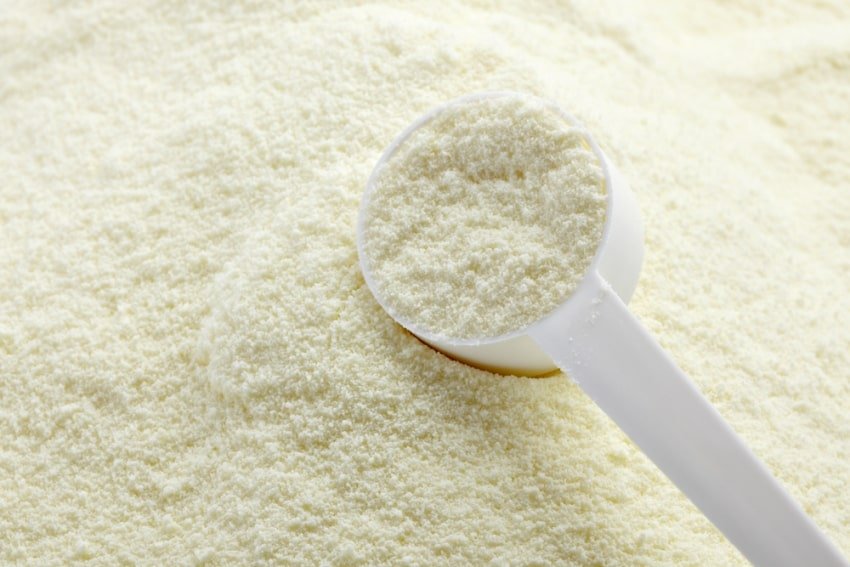
You must be sure that the formula that you give your baby provides them with enough calories, proteins, and fat for them to grow and develop normally.
Almost all homemade formula recipes are made from a base of milk or broth, that you then add real food to and nutrient-dense ingredients such as gelatin, probiotics, high vitamin oils/fat, and acerola.
You will have to commit to making formula daily for the best results and for it to be at its freshest for your baby to enjoy.
Point to note is that most formula recipes are designed to provide optimal nutrition for babies and that modifying them should be avoided. So when choosing a recipe, ensure that it is one that you can commit to long term.
5. Hemp Milk
Hemp milk is made by blending water with the seeds of the hemp plant. It is legal and packed with the vitamins, minerals proteins, and fats that your growing baby needs.
It is the same plant that is used to produce marijuana, but hemp milk does not cause any mind-altering effects like marijuana does. Hemp milk contains the vast majority of the minerals and vitamins that your little one needs, such as Omega 6, 3, and 9. It also contains magnesium, calcium, potassium, iron, and zinc.
[amalinkspro type=”showcase” asin=”B00MFCHYS2″ apilink=”https://www.amazon.com/dp/B00MFCHYS2?tag=mominformedcom-20&linkCode=osi&th=1&psc=1″ new-window=”true” addtocart=”false” nofollow=”true” sc-id=”4″ imgs=”LargeImage” link-imgs=”false” specs=”Smooth and creamy texture with a nutty flavor~~~Made from the hemp seed, it’s a great source for plant-based nutrition including Omega 3 ALA~~~Good source of calcium, magnesium, and vitamin D~~~” btn-color=”#ff9900″ btn-text=”Buy on Amazon” alignment=”aligncenter” hide-prime=”0″ hide-image=”0″ hide-reviews=”0″ hide-price=”0″ hide-button=”0″ width=”750″]Pacific Foods Hemp Original Unsweetened Plant-Based Beverage[/amalinkspro]
Plain organic hemp milk also contains no sugar, no cholesterol, and is free of soy and gluten. With this in mind, hemp milk could be the perfect option for children with dairy intolerance and allergies.
Hemp milk has an earthy, nutty flavor and a very creamy consistency. It can be used to replace cows milk in coffee, cereal, and smoothies, for example.
Due to its vitamin and mineral content, many parents use hemp milk and coconut milk to create their own infant formula. Hemp milk is widely available in most grocery stores and online.
Final Word
To be honest, I have had five children and would never have thought of using an alternative to breast milk or commercial baby formula.
Thankfully, my children are lucky. They don’t have lactose intolerance and have never suffered from allergies or issues with milk. If they had, maybe I would have been looking for a less than the conventional alternative.
I think that as long as you do your homework and consult your pediatrician, an unconventional approach to feeding your baby is fine.
You must remember that there is a lack of information concerning using these alternative types of milk and formulas and the effects that they may have on the baby’s growth and development.
As long as this is closely monitored, I feel that there should be no issue at all.
